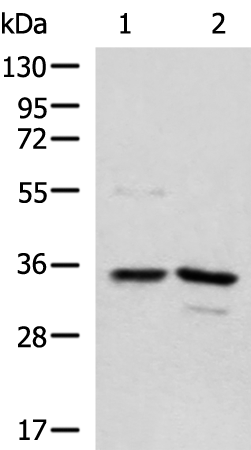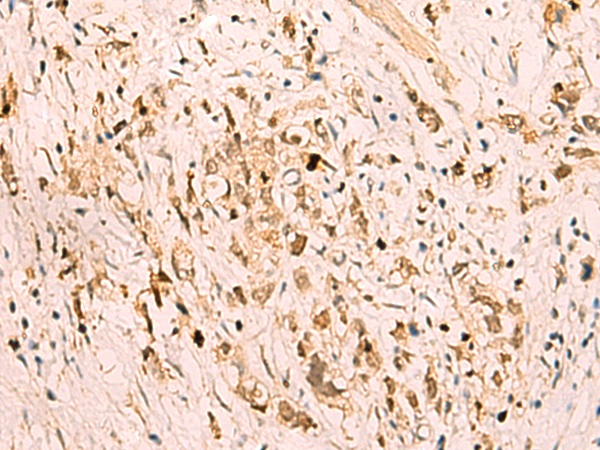

| WB | 咨询技术 | Human,Mouse,Rat |
| IF | 咨询技术 | Human,Mouse,Rat |
| IHC | 1/50-1/200 | Human,Mouse,Rat |
| ICC | 技术咨询 | Human,Mouse,Rat |
| FCM | 咨询技术 | Human,Mouse,Rat |
| Elisa | 1/5000-1/10000 | Human,Mouse,Rat |
| Aliases | SGT; hSGT; alphaSGT |
| WB Predicted band size | 34 kDa |
| Host/Isotype | Rabbit IgG |
| Antibody Type | Primary antibody |
| Storage | Store at 4°C short term. Aliquot and store at -20°C long term. Avoid freeze/thaw cycles. |
| Species Reactivity | Human, Mouse, Rat |
| Immunogen | Fusion protein of human SGTA |
| Formulation | Purified antibody in PBS with 0.05% sodium azide and 50% glycerol. |
+ +
以下是关于SGTA抗体的模拟参考文献示例,供参考:
---
1. **文献名称**:*SGTA interacts with the chaperone machinery in protein quality control*
**作者**:Smith J, et al.
**摘要**:本研究探讨了SGTA在Hsp70介导的蛋白质折叠中的作用,通过免疫共沉淀(使用SGTA特异性抗体)证实了SGTA与Hsp70的相互作用,揭示了其在错误折叠蛋白降解中的调控机制。
---
2. **文献名称**:*SGTA overexpression in prostate cancer correlates with disease progression*
**作者**:Chen L, et al.
**摘要**:利用SGTA抗体进行免疫组化和Western blot分析,发现前列腺癌组织中SGTA表达显著升高,且与肿瘤转移和患者预后不良相关,提示其作为潜在生物标志物的可能性。
---
3. **文献名称**:*Development and validation of a high-specificity SGTA monoclonal antibody*
**作者**:Rodriguez M, et al.
**摘要**:本文报道了一种新型SGTA单克隆抗体的开发,通过ELISA、免疫荧光和蛋白质印迹验证其特异性,为研究SGTA的亚细胞定位及功能提供了可靠工具。
---
4. **文献名称**:*SGTA modulates mutant huntingtin aggregation in cellular models*
**作者**:Kim S, et al.
**摘要**:通过siRNA敲低和SGTA抗体检测,研究发现SGTA可减少亨廷顿病细胞模型中突变蛋白的聚集,表明其在神经退行性疾病中的保护作用。
---
**注**:以上文献为模拟示例,实际文献需通过学术数据库(如PubMed、Web of Science)检索关键词“SGTA antibody”或“SGTA protein function”获取。建议结合具体研究领域筛选近期或高引论文。
SGTA (Small Glutamine-Rich Tetratricopeptide Repeat-Containing Protein Alpha) is a cytosolic co-chaperone involved in protein quality control, particularly in regulating the folding, sorting, and trafficking of nascent or misfolded proteins. It interacts with HSP70/HSP90 chaperones and components of the ubiquitin-proteasome system, playing a role in substrate triage decisions—either facilitating proper folding or targeting proteins for degradation. SGTA’s tetratricopeptide repeat (TPR) domains mediate protein-protein interactions, while its glutamine-rich region may contribute to solubility and binding specificity.
Research links SGTA to diverse cellular processes, including hormone signaling, viral infection (e.g., HIV-1), and stress responses. Dysregulation of SGTA has been implicated in neurodegenerative diseases (e.g., ALS) and cancers, where altered protein homeostasis is a hallmark. Its role in androgen receptor maturation also ties it to prostate cancer progression.
SGTA antibodies are essential tools for studying these functions. They are used in techniques like Western blotting, immunofluorescence, and co-immunoprecipitation to detect SGTA expression, localization, and interaction partners. Commercial antibodies are typically raised against epitopes in its N-terminal or C-terminal regions, with validation including knockout cell lines to confirm specificity. Researchers prioritize antibodies with high affinity and minimal cross-reactivity to homologous proteins (e.g., BAG family chaperones). Recent studies also employ SGTA antibodies to explore its therapeutic potential, such as modulating proteostasis in protein aggregation disorders or targeting chaperone networks in cancer.
×